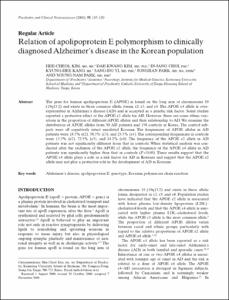Relation of apolipoprotein E polymorphism to clinically diagnosed Alzheimer's disease in the Korean population
- Keimyung Author(s)
- Kim, Hee Cheol; Park, Young Nam; Kim, Dae Kwang; Choi, In Jang; Yi, Sang Do
- Department
- Dept. of Psychiatry (정신건강의학)
Dept. of Medical Genetics (의학유전학)
Dept. of Anatomy (해부학)
Dept. of Neurology (신경과학)
Institute for Cancer Research (암연구소)
- Journal Title
- Psychiatry and Clinical Neurosciences
- Issued Date
- 2001
- Volume
- 55
- Issue
- 2
- Keyword
- Alzheimer's disease
- Abstract
- The gene for human apolipoprotein E (APOE) is found on the long arm of chromosome 19 (19q13.2) and exists in three common allelic forms, epsilon2, epsilon3, and epsilon4. The APOE epsilon4 allele is overrepresented in Alzheimer's disease (AD) and is accepted as a genetic risk factor. Some studies reported a protective effect of the APOE epsilon2 allele for AD. However, there are some ethnic variations in the proportion of different APOE alleles and their relationship to AD. We examine the distribution of APOE alleles from 30 AD patients and 158 controls in Korea. The control subjects were all cognitively intact unrelated Koreans. The frequencies of APOE alleles in AD patients were 18.3% (epsilon2), 58.3% (epsilon3), and 23.3% (epsilon4). The corresponding frequencies in controls were 13.3% (epsilon2), 72.5% (epsilon3), and 14.2% (epsilon4). The frequency of the APOE epsilon2 allele in AD patients was not significantly different from that in controls. When statistical analysis was conducted after the exclusion of the APOE epsilon2 allele, the frequency of the APOE epsilon4 allele in AD patients was significantly higher than that in controls (P < 0.05). These results support that the APOE epsilon4 allele plays a role as a risk factor for AD in Koreans and suggest that the APOE epsilon2 allele may not play a protective role in the development of AD in Koreans.
Key Words: Alzheimer’s disease, apolipoprotein E, genotype, Koreans, polymerase chain reaction.
- Publisher
- School of Medicine
- Citation
- HEE-CHEOL KIM et al. (2001). Relation of apolipoprotein E polymorphism to clinically diagnosed Alzheimer's disease in the Korean population. Psychiatry and Clinical Neurosciences, 55(2), 115–120. doi: 10.1046/j.1440-1819.2001.00797.x
- Type
- Article
- ISSN
- 1323-1316
- Appears in Collections:
- 1. School of Medicine (의과대학) > Dept. of Anatomy (해부학)
1. School of Medicine (의과대학) > Dept. of Medical Genetics (의학유전학)
1. School of Medicine (의과대학) > Dept. of Neurology (신경과학)
1. School of Medicine (의과대학) > Dept. of Psychiatry (정신건강의학)
3. Research Institutues (연구소) > Institute for Cancer Research (암연구소)
- 파일 목록
-
-
Download
 oak-aaa-03897.pdf
기타 데이터 / 111.9 kB / Adobe PDF
oak-aaa-03897.pdf
기타 데이터 / 111.9 kB / Adobe PDF
-
Items in Repository are protected by copyright, with all rights reserved, unless otherwise indicated.